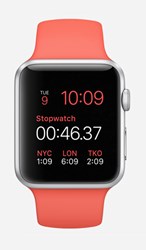Apple Watch Drives MD Anderson Cancer Study
By Jof Enriquez,
Follow me on Twitter @jofenriq

MD Anderson Cancer Center at Cooper (New Jersey) reportedly is planning a behavioral health study that will require cancer patients to use Apple Watches to track their health data. The pilot project will use an analytics platform developed by behavioral health company Polaris Health Directions.
MobiHealthNews reports that 30 breast cancer patients being treated at MD Anderson will use Apple Watches, and matching iPhones, to monitor their own health and keep contact with their care team. The initial phase will span a nine-month period, after which the study could proceed to a Phase 2 control trial.
Using their Apple Watches, patients will be able to answer multiple-choice questions about topics including their symptoms and treatment side effects. The Apple Watch also will collect data about a patient's heart rate and activity. The iPhones will provide sleep tracking. The study’s goal is to collect real-time health data and communicate the information to care providers so that they can quickly help patients, before symptoms worsen. The timeliness of interventions is expected to improve health outcomes.
The pilot cancer study will use Polaris’s Polestar behavioral health outcomes management (BHOM) data-collection-and-analytics platform, which provides actionable results for reporting on and monitoring a patient’s expected treatment response, according to a HIT Consultant article. The project will be reviewed by the Cooper Institutional Review Board, while MD Anderson Cooper and Polaris will jointly publish their study findings.
MD Anderson Cooper’s director of behavioral medicine, Cori McMahon, Psy.D., is the medical project lead for the study. She told MobiHealthNews that the program will help patients when they are first diagnosed and when they are undergoing active treatment. McMahon and her team believe the Apple Watch can keep patients engaged throughout the continuum of care, akin to how people who start using a pedometer tend to increase their walking activity.
“For the Apple Watch, it’s that opportunity magnified by a million," McMahon said in an interview with MobiHealthNews. "If we can gain insights into health behaviors, health problems, treatment side effects… a lot of our patients get three to four months into chemo before they figure out how their body is reacting. It’s not until then that they figure out what to tell their physician. ‘Oh, I see that for a couple days after [chemo] I’m incredibly nauseated or fatigued.’ It takes patients months to figure this out. If we can help patients figure this out earlier, we are going to improve quality of life and quality of adherence.”
The cancer pilot study with MD Anderson is the latest partnership Apple has forged with healthcare industry players. The company already has agreements in place with EMR giant Epic Systems, the Mayo Clinic, Cleveland Clinic, Johns Hopkins, and Mount Sinai, each of whom has pledged to apply Apple's HealthKit platform in clinical settings.
Related, diabetes device maker Dexcom has developed a continuous glucose monitoring (CGM) app for the Apple Watch. Apple has given guidelines and code to developers to encourage creation of health apps that extend the Apple Watch's health-tracking capabilities.
